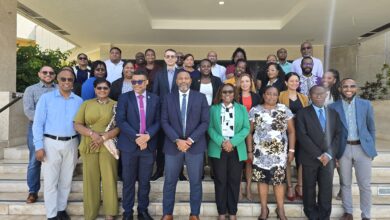Salutations
The work of the Caribbean Telecommunications Union is an area of continuing interest to the Caribbean Community Secretariat for several reasons, not least of which is that the CTU was established by the Heads of CARICOM Governments. It is, therefore, a privilege and a pleasure to address this landmark meeting of your Council, coming, as it does, at a time when telecommunications must play a vital role in the collaborative process of repositioning the people, organs, and organisations of the Caribbean, as we move ahead to create an information society, to reduce, and eventually remove inequality, and to close the digital divide.
Not so long ago, telecommunications was an esoteric area of interest only to engineers, technicians, investors and government regulators. That situation is changing and changing rapidly. Today, telecommunications planners and engineers must become partners with national planners, consumers, community workers, educators and advocates, working towards achieving universal connectivity for accelerated and universal development.
You in the CTU demonstrate this realisation in your choice of the theme of this meeting: “Charting a new course for the Caribbean Telecommunications Union”.
We see connectivity as a society’s internal capacity for communication with its global environment through the use of telecommunications and information technologies, and through the products of its content industries. Within the context of the Caribbean Community, the purpose of connectivity is to enable each Member State of the Community to evolve into an information and knowledge-based society, through the acquisition, customising, and utilisation of information and communication technologies [ICTs].
Indeed ladies and gentlemen, the very adoption and today, constant use, of the acronym ICT, is an acknowledgment of the universal realisation that communication must be at the heart of development and deployment of information technologies.
The Heads of Government of CARICOM have acknowledged the potential of ICTs for enhancing and integrating our societies, while recognizing at the same time the increasing challenges posed by the digital revolution, including the digital divide, to smaller economies. For this reason, they have underscored the need for a regional approach and agenda, which would focus on achieving a connected Community.
The Secretariat was therefore mandated in July 2003 to pursue a CARICOM agenda for connectivity which would enable full advantage to be taken of ICTs and content in economic, social, cultural and political development, with the aim of preparing the region to evolve towards an information society.
The CARICOM Connectivity Agenda sets out four basic approaches:
· The formulation of policies
· Legal and regulatory reform
· E-assessments
· De-monopolisation of telecommunications.
Its focus rests on two main pillars. One is global development, namely, minimising the digital divide and accepting the World Summit on Information Society (WSIS) process as the highest authority of principles on ICT development. The other is trade, that is the removal of restrictions within a single economic space in CARICOM, and expanding that space beyond geographic definition through simultaneous external negotiations in principal theatres (WTO, FTAA, and EU) and ongoing bilateral engagements.
As a community, CARICOM favors an approach to ICT development consistent with hemispheric and global approaches, highlighting three basic premises for success:
· That our connectivity agenda must be designed and implemented with the active participation of civil society including the private sector
· That it must be based on principles of equity, universality and affordability, and
· That it must be geared to stimulate the production and availability of relevant content in critical areas addressing the fundamental needs of our Caribbean citizens.
As the region enters a new economy and society defined by its vastly enhanced capacity to access and disseminate information; to transform that information into knowledge, and ultimately the information and knowledge-based society, certain guiding principles must be adhered to in the quest for universal accessibility and affordability in the Member States of the Community. These include:
· Training in the use of ICT services
· Equitable, universal and affordable access to information
· Transparency
· Protection of intellectual property
· Technological neutrality
· A competitive ICT industry
· Effective civil society participation in the development of the regulatory framework
· Coordination of legislation governing the information and communications sectors
· Focusing on regional objectives as defined in the Revised Treaty of Chaguaramas
Using these overall guiding principles, each member state must develop national strategies for connectivity which address diverse yet vital issues such as education, health, generation of employment, economic opportunities, investment strategies, democratic participation and protection of human rights, gender equality, economic development, particularly small and medium-size industries, commerce and services, tourism, the agricultural and export sectors, culture and recreation.
An important posture in moving towards a Caribbean an information society is to see that all approaches merit consideration, and that the right mix can evolve only through ongoing consultation and openness to alternative perspectives, concerns, and anxieties.
Through a rapid change in the telecommunications landscape in the region, and employment of more efficient and affordable technologies, it is now easier for consultation in Member States to consider the attributes of all technologies, and strive to be technologically neutral. Land-lines, Internet access technology, complementary wireless solutions, and community radio broadcasts today provide a combination, or at least a range, of channels for accessing information.
The options are many, diverse, and challenging, yet vital to the “New Course for the Caribbean Telecommunications Union”. In addition there are roles for each stakeholder:
Governments must make the necessary legislative and regulatory changes to provide an ongoing guarantee of legal certainty to companies developing infrastructure for connectivity. Governments must also provide assurance of a competitive environment and a climate of confidence for investment that provides security to private investors.
The private sector should source and adopt telecommunication technologies and build partnerships, which engender and sustain trust in the digital marketplace. This sector should encourage also, the adoption of electronic commerce, especially by Small and Medium Scale Enterprises (SMEs).
The Public Sector must work to create a culture of Government as a model user and provider of Government services on-line which address the needs of civil society
Interestingly enough, it is not only the CTU that has to chart a new course.
The Secretariat also, in carrying out its diverse mandate, is now challenged with developing and sustaining an awareness of the importance of ICTs as tools of development, to be deployed to, and employed by, all sectors of society and all communities, including those of rural and indigenous peoples.
This programme of awareness will be aimed at governments, the private sector, civil society, telecommunications providers & regulators, small and medium-size enterprises, artistes, designers, developers and manufacturers.
The need for stimulating this awareness at the highest levels became stark, during the recently concluded World Summit on Information Society (WSIS) held in Geneva last December. The Summit brought together over 6000 participants and exhibitors from a broad array of disciplines and areas of interest. Plenary sessions were addressed by some 40 Heads of Government from around the world as well as the United Nations Secretary-General.
This Summit was something of a wake-up call for us in the Caribbean to the need to participate at all levels in the debate on, and the design of, an information-based society of the 21st-Century.
The CARICOM Secretariat is actively seeking partnerships in this awareness effort, and of course, the CTU, by its mandate, and its own initiative, is one of those partners.
The next phase of the World Summit on the Information Society will take place in Tunis next year. Between now and then, the Secretariat will be working assiduously to mount at least two workshops; one of which will be focused at the level of policymakers in member states, to ensure greater and more active participation in major international fora, events, and opportunities relating to the adoption of ICTs, and the evolution of an information society in the Caribbean.
The imperative for us in the region, however, is more than participation in international meetings and exposure to technologies. Rather, it is also to truly understand the opportunities inherent in the adoption of information and communication technologies in the development efforts of our rapidly changing Caribbean community. Above all, we need to see ICTs as an important tool for our social and economic development. This is especially relevant, given that we are already experiencing the predicted impacts of globalization; we need therefore to accord it the urgency, priority, and inclusion the process deserves.
I wish you productive deliberations, and look forward to your sharing your decisions and consequent plan of action with the Secretariat.





